MIKE RABON, THE FIVE AMERICANS
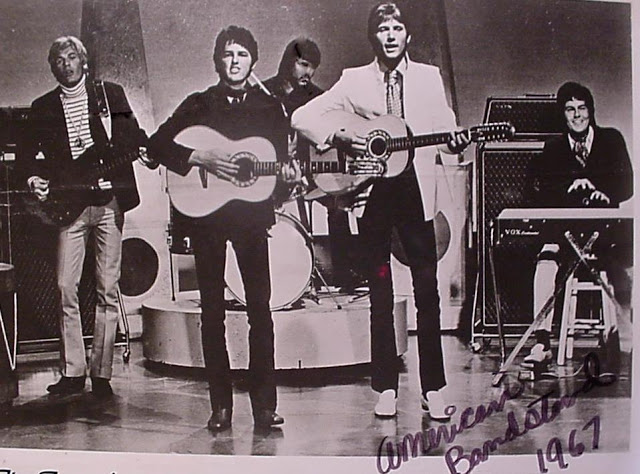
The Five Americans on American Bandstand
Mike Rabon and The Five Americans
Interview by Paul Heckmann, Executive Director Memories Inc.
Edited by Mark Cheyne, Administrator Memories of Dallas
Paul Heckmann: Good afternoon Mr. Rabon!
Mike Rabon: Hey Paul, how are you?
Paul: Doing well, thanks for asking. Let’s kick this thing right into overdrive. Tell me about where you grew up.
Mike: I grew up in a little place outside of Hugo called Spencerville, and it had a population of probably about 600. Tinytown, USA.
Paul: I understand that your parents were schoolteachers.
Mike: That’s correct. They taught at a teacherage there, the same place were we lived, a tiny one building school which was also our residence.
Paul: Interesting. Did they teach everything?
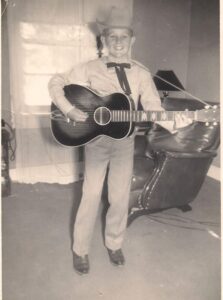
13 year old Mike Rabon
Mike: Everything from first to eighth grades. The school was about 50 students, a really small town.
Paul: So everybody knows everybody’s business, you better watch your Ps and Qs.
Mike: That’s right.
Paul: So, who were your favorite bands that you would listen to growing up in Spencerville?
Mike: It’s hard to say bands because that was during the ‘50s, I’m thinking that is was more like single artists. Frankie Lymon, Elvis Presley, folks like that. I listened to WLS in Chicago and WNOE in New Orleans, they boosted a bit of power after 6:00pm I think, so you could get it quite clear in Oklahoma.
Paul: How long were you in Spencerville? Mike: I was there until I was about freshman in high school. We moved to Hugo, Oklahoma, just across the Red River from Paris, Texas. Not that far from Greenville.
Paul: There we go. You were almost a Texan.
Mike: I love Texas. In fact, my third album as a single artist was called “Texas ‘Til I Die.”
Paul: Love it! We certainly have a little braggadocio here, that’s for sure.
Mike: Absolutely.
Paul: Now, you’ve moved to the big city of Hugo, Oklahoma. At what point do you meet your buddies to form the Mutineers?
Mike: Well, when I was graduating high school, I did six months’ active duty, and  from there, I went to SOSU, Southeastern Oklahoma State University, which is in Durant. I think it was called Southeastern College then. That’s where I met all four of the other Five Americans.
from there, I went to SOSU, Southeastern Oklahoma State University, which is in Durant. I think it was called Southeastern College then. That’s where I met all four of the other Five Americans.
Paul: Thank you for your service. And how far away from Hugo was SOSU?
Mike: About 60 miles.
Paul: Okay, far enough that the parents weren’t there every day checking up on you, but close enough you could get your clothes washed and dried.
Mike: Indeed. It was a suitcase college.
Paul: Were you going back and forth on weekends?
Mike: You could have, but by that time I was living in the dormitory, and I had taught my roommate how to play the bass. We went looking for some other folks as I needed a band really bad. I taught the guy that played rhythm guitar how to play too.
Paul: Who was your roommate that you taught to play bass?
Mike: Jim Grant.
Paul: No kidding?
Tell me about the Pirate’s Cove. Sounds like a really small place.
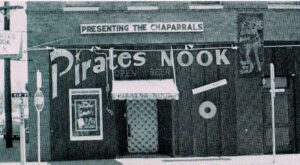
The Pirates Nook
Mike: That’s exactly what it was. The acoustics were okay. The stage was barely big enough to hold five of us. I’m guessing the fire marshal might let in 50 or 60 people. It was a tiny little club. We would play mostly just about for free. Bill Ware, the owner, would treat us and pay us when he could.
Paul: But they had dancing girls!
Mike: Yes they did!
Paul So I guess Bill Ware’s biggest contribution was exposure. And that would lead to The Studio Club and then Louann’s.
Mike: Yes, that’s true. Lots of folk got their starts or exposure at Studio Club and everybody from Harry James to Rod Stewart played at Louann’s
Paul: I know Felicity played there a lot at Studio Club which of course was Don Henley’s group, he of future Linda Ronstadt and The Eagles fame. And of course the owner was Larry Lavine in his pre-Louann’s and pre-Chili’s days.
Mike: And Kenny and the Kasuals and so many other folk.
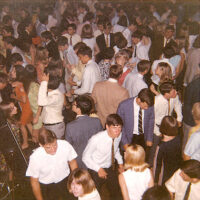
Studio Club packed to the gills
Paul: The Studio Club. Tell me about it.
Mike: It was a much bigger club, we weren’t so squashed on the stage like the Pirates Nook. I guess they could hold a couple of hundred people and there was a balcony overlooking the main floor. And the acoustics were much better. And then we were introduced to one of the Dallas DJ’s Ken Dow. And, Ken introduces us to John Abdnor Jr. That’s when we started to get some exposure into the recording studio. His dad John Sr. had started some record labels that featured his John Jr. in the group ‘Jon and Robin’. That started our journey with Abnak Records.
Paul: Now here comes Roger Guggenheimer. And the first thing he says is that you should change your name. Now, if I’m a Mutineer and I’ve invested two years into this thing, I would think it’s time for a mutiny! How did that go over?
Mike: Oh my gosh, not good at all. We didn’t like it. But in retrospect, it was a good move. The strategy was to take the British groups head-on. The top 10 was full of Stones, Beatles, Kinks, you name it.
Paul: The British Invasion, I remember it well.
Mike: Exactly. Instead of mimicking them, we needed to create something different so we became the American answer to the British, the clean-cut young Americans.
Paul: It’s 1964. So, John Abdnor sends you up to Sumet Recording, and you do the song “It’s You, Girl, and I’m Gonna Leave You,” and “Slipping and Sliding.”
Mike: Yes, we did. I had a busted Gibson amp. The speaker broke in it, and I have to give myself credit for having the first fuzztone on a guitar!
Paul: Ha! Whatever works, right? BTW, what kind of guitar?
Mike: It was a Gibson, and I was playing through a Gibson amp, and it was a little, small amp. When you break those speakers, it turns a little fuzzy, so if you listen to that, you can hear the fuzz on it. That was on Abdnor’s other label. Starlight or something like that. I always thought he copied off the design right off Zinicka Records. I don’t know how he got away with that.
Paul: It sounds like he got away with a few things.
Mike: Oh yeah.
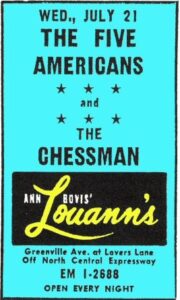
The Five Americans at Louann’s
Paul: We will cover that in a bit, but I wanna talk about the good stuff here first. You started working at the primo Dallas club back then, Louann’s. In the 31 years they were open they went from Lawrence Welk and Harry James to Chubby Checkers and Chuck Berry to Jeff Beck and Rod Stewart.
Mike: Louann’s was THE club to play at in the Southwest.
Paul: And in 1965, Abner sends you to Nashville, to work on “Say That You Love Me.” I was kind of curious if any of you had ever been there before.
Mike: Heck, we’d never even been on a plane before, but Abdnor sent us out there with Dale Hawkins. When we got out there, Dale had hired all session musicians to play in our stead. So, we got into the studio there at
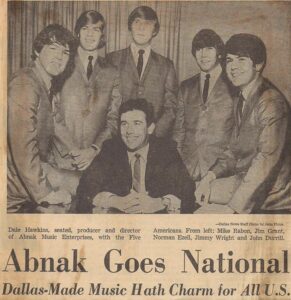
The Five Americans with Dale Hawkins
Columbia Studios, they laid down the tracks, and we didn’t play on them. We were temporarily the Monkees on that one. That was the first and last time that happened
Paul: It didn’t really pan out the way you guys thought it would, did it?
Mike: No, not really. That was our first according and our first attempt at writing original songs, and we also did a flip side. That, I think, was “Love, Love, Love,” an old Jewel Akens song. “Nothing in the world for a boy and girl but love, love, love.”
Paul: Oh yes. You are taking us down Memory Lane here.
Mike: Yes indeed. Far back. Anyway, after that, that was the last of anybody playing for us on our records. We wouldn’t have it, and Abdnor saw that.We were not happy. We went into Sumet again, and we’d written a song called “I See the Light,” and we worked on that one. We had an old Wollensak recorder, and we practice that over and over and over, and then he sent us into Sumet, and we recorded it, and we did something different. We doubled the bass drum on that one, and we got a lot of attention for that, especially in England, the Small Faces. They reviewed that release, and of course, Rod Stewart, Rod Stewart was with them at the time, and they said that – they mentioned that, that more British bands should have that punchy bass drum, not knowing that it was doubled on the track.
Paul: What does “doubled” mean?
Mike: It means you play it once through to record it, and then you lay another track on top of that and double it up.
Paul: I see, same person?
Mike: Yeah, same person, same band, everything. I did that a lot with the guitar. Bands were doing it a lot back then. We did that at Sumet’s new studios, I believe. We recorded “Western Union” at Tyler.
Paul: Robin Hood Brians’ studios.
Mike: Exactly.
Paul: Was Dale Hawkins on both those records?
Mike: He got credit as producer, but he didn’t do much. He just kind of sat in the control room. You need somebody in there to make sure you’re not screwing up royally, you know?
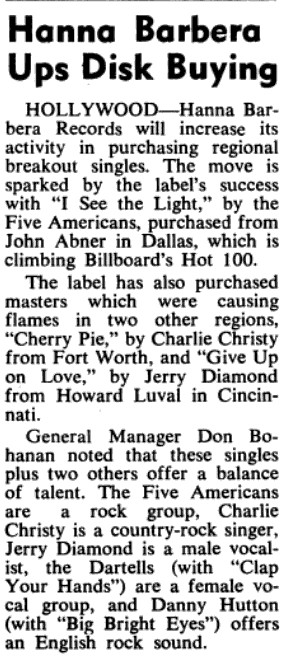
Hanna Barbara and ‘I See the Light’
Paul: To make sure Mike Rabon’s not hogging the mic.
Mike: (laughs) Exactly. Had to watch for that.
Paul: I know that Hanna-Barbera bought “I See the Light” from Mr. Abner in 1966, but you guys actually remain with ABNAC. I don’t quite understand how that works out. Did they just buy one song?
Mike: Hanna-Barbera was in the cartoon business so they decided to make a foray into the music business. They bought the right to distribute that record, and that record had “Evol – Not Love,” our second release, which made the top 40. Abner paid for the recording and paid us, and made a contractual agreement with Hanna-Barbera to distribute it nationwide because he couldn’t do that because he had three-state distribution out of Dallas there, called Big State Distribution. So, he leased rights to distribute our next couple of records and an album, and I’m sure he took Hanna-Barbera for quite a ride on that. Paul: So now we are entering the magical years, “Western Union” in 1967. Holy cow. I love that hook!
Mike: I know, I know! We watched the Billboard charts awful close. I think the tune got up to No. 3, and No. 1 was Nancy and Frank Sinatra had a song called “Something Stupid,”, kinda went “By saying something stupid, like I love you”. I think it was written by Lee Hazlewood. No. 2 was “Eleanor Rigby,” and No. 3 was “Western Union.”he Beatles behind it didn’t hurt. Now, that’s a fully armored, battle ready Panzer tank coming at you. And a Frank Sinatra song, it doesn’t really matter what he was singing, it could be him signing octaves, that name is magic.
I think “Western Union” would have been No. 1 had it not been for those two songs. That’s some serious competition.
Paul: Now you had this top 5 hit. Did things improve for you financially?
Mike: In a manner of speaking. Better hotels and travel. There was this Beechcraft that we used and we had road managers, stuff like that – but we were still on a draw vs royalties, that did not change. We flew almost everywhere we went, one night in this city, the next night in another
Paul: Tell me about coming up with the hook for “Western Union”.
Mike: “I See The Light” had gotten us enough national attention to get us on tour, so we were on tour with Paul Revere and the Raiders. We were up in Oregon, this was before the plane and we were still riding in cars, I think everybody else had buses, but no, we had a car. So, anyway, we were going through Oregon en route to Seattle, and I saw a sign that said “Western Union”, you don’t see many of those in Spencerville, and so, I said, “What if we were to write a song where a guy gets a ‘Dear John’ letter”? Instead of a letter, he got a telegram from his gal, and that way, it’d be high technology of the day. Everybody in the band said ‘yeah!’ : And so, we got back to Dallas and three days later, went down to Robin Hood’s, and recorded that in about 30 minutes. The rest is history.
Paul: Now, at this point, you gotta be feeling you could crush the Beatles and take on the Rolling Stones.
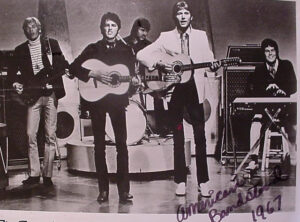
The Five Americans on American Bandstand
Mike: We tried. They even called us the Texas Beatles for a while! About six months later, we did American Bandstand, Dick Clark really liked us. We did The Steve Allen Show, and everywhere we went, we did local television shows. Producers liked us because we dressed nice, got haircuts, and all that stuff.
Paul: Hey, you were the young Americans. I want to come back to the Steve Allen Show in a couple of minutes but tell me more about being young and groovy.
Mike: Ha! We were both. That’s so true. We appeared on Dick Clark’s Where the Action Is. Wherever he was – if we were playing in Houston somewhere and Dick Clark knew about it, he’d call us and say, “Would you guys come over and tape a song?” We would come by, go out by a swimming pool or something and tape our newest tune for him. We were on that show four or five times with the Knickerbockers and Paul Revere and the Raiders, so we were hot stuff. At this point we didn’t play clubs so much unless they were huge venues. We did play lots of theaters, concert halls and convention centers – anywhere you could book a lot of people. We did a lot of work with Dick Clark’s Caravan Of Stars and wherever that took us, that’s where we would go. Some of the groups we played with were Sam The Sham, Bobby Vee, The Young Rascals and Strawberry Alarm Clock. I think they would run for about 3 weeks at a time, a different city every night.
Paul: At this point, once you’ve done “Western Union.” Tell me about the followups.
Mike: Yeah. Got a lot of pressure from radio stations and our manager a lot for a “communication” song after “Western Union,” and we didn’t want to, but we did, and we wrote “ZIP Code,” which is a yet another communication song, but ya gotta admit, it turned out pretty good. It made top 40. And then, we landed a few more charts at communication songs, and we grew tired of the whole ordeal because Abner was screwing us out of our money. Paul: Well, let me hold onto that for just a second here because I wanna talk about something good before we get into Mr. Abner. I wanna talk about that TV show Something Else here in Dallas. Ron Chapman really loved you guys.
Mike: We had a great working relationship with Ron.
Paul: Yeah, he loved you. Bud Buschardt cannot stop talking about you.
Mike: Bud’s a good guy. He was a Producer for that show.
Paul: I was curious if you played live or recorded music there. I couldn’t see any cords.
Mike: No. Nobody did, which for the most part, was just kind of the way you did things in those days.
Paul: What about The Steve Allen Show?
Mike: That was one that we played live on.
Paul: Tell me about Steve Allen. Mike: Well, he’s a nice guy, really funny in his own way. He liked us or the same reason other guys did and he sure was a network show, so we were glad to be on it. First thing he asked us after we played our song, he had us come over to the dais to sit down and song and he deadpans– “Now, how many are in the group?” The Five Americans, yeah.
Paul: Was he having a little fun there?
Mike: Yeah, we had to laugh at him.
Paul: So, at this point, you’ve been on the road, you’ve done Dick Clark, you’ve been to Oregon, you’ve been to Cali, you’ve been to Timbuktu. Tell me about some of the road stories we should know about. Who was the biggest – what my brother Bill Bronstad and the other Lambda Chi’s used to call the “golden bone,” the guy that always did something silly, and you guys would get such a kick out of it? The one guy in the group that’s always doing something silly, and the rest of them would pile on.
Mike: That was probably me, but those tales will stay hidden forever
Paul: You’ve now done Dick Clark. Whats next? We played some big venues after Dick Clark – we played at the Whiskey-a Go Go. We played a week there. it was us and a group called ‘The Hourglass’. Are you familiar with them?
Paul: That name does sound familiar.
Mike: It’s the Allman Brothers. In fact, I blew up his amp. We couldn’t trade amps every set, so we just ended up using their equipment. I cranked it up a little loud and kaboom. But, they were a little too good for us. We were uncomfortable because they were just too damn good.
Paul: Well, had they hit that groove yet that the Allman Brothers did at that point?
Mike: Yeah, good Southern rock. It was probably early ’68, maybe January. It was a wild time. All out in front of Whisky on Hollywood Boulevard were these long haired hippie s. Lots of anti-war stuff was starting right about then. We went to the first love-in out in Malibu.
Paul: Since we are talking revolution, that’s a pretty good way to segue into John Abdnor and the revolution that followed, the final days of The Five Americans.
Mike: It did not end well with John. We were on a monthly draw. Once a month, we got paid, just like if we were employees. And at the same time, we had the No. 5 record there, and then a bunch of Top 40s, or at least four or five. And we’re still drawing the same amount of money. So, we went up to confront him about it, and we got into a big yelling match with him.
Paul: A lot of hollering and screaming.
Mike: Yep, we had to just go back and regroup. And two of the guys decided they wanted to leave the group anyway, by then, we’d written all the communication songs that we could think of. And so it was amicable. Norman Ezell and John Durrill, the keyboardist left and went to California. John got a job with The Ventures. We knew some people in the business, like Bobby Dee and he recommended John to Ventures. And sure enough, they liked him, and he got a job touring with them. Norman took work in restaurants and food service or whatever he could find to do, but anyway, that broke the original band up. In order to squeeze out every little ounce of money that was left in The Five Americans, Abdnor says, “You gotta cut an album for me, and we’ll call it Michael Rabon & The Five Americans.” playing to my ego. So I needed the money, I couldn’t just stop making money at that point. My life was not situated that well so, I went ahead and went back to the studio in Tyler. And we recorded the ‘Now And Then’ album.
Paul: And what a change it was Mike: What we did is we recorded the Now part, and he had the Then part of it on 16-track masters. So, anyway, he printed that up, and it came out, we had to finish what gigs we had left. Didn’t have to. I guess, but otherwise, it’d been a disaster for a lot of good people. So I hired Bobby Rambo of The In Crowd, and then I hired a guy in San Diego named Lenny Goldsmith for keyboard, and he came through, and we flew him in. And we finished up a few gigs in New Orleans and places like that. And when we got through with our commitments, I told Abdnor that I was leaving. I moved to California, and lived out there for a while. I finally signed up with Mercury Records. They offered me a record deal and I needed money, I needed to get in the studio, So, I signed with Mercury, which I probably shouldn’t have done. I wasn’t legally able to because I was still technically with Abnack. But I did anyway because I knew that neither one of them was gonna sue me because I didn’t have any money, just a poor musician. And so, they worked it out between them, and I got some front money, and stuff like that. And I came back to Abnack, and we kinda finished up as Mike Rabon, a solo artist. Choctaw came along toward the end, just before Abdnor and I broke up for good. I was still just Michael Rabon at that point. And so, I wrote an album worth of songs, and he really liked them. So, I went down and recorded them back in Tyler again. I’ll just come out and say it. They were really good. And so, I referred out to Universal and – in Los Angeles and played them for Russ Regan, whom he knew who was A&R for UNI Records, Universal. And he said, “I gotta have this album.” And so, we said, “Okay, you’ve got it.” And he gave us some upfront, like 10 grand or something like that, which was a lot back then. And he gave us 10 grand. We spent it up. And I said, adios. And that’s when I left, actually. That was the end of that deal.
Paul: And that was that
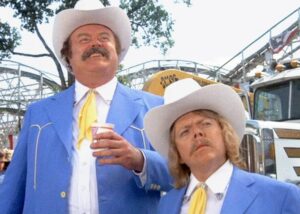
Big and Little Enos in ‘Smokey and The Bandit’
Mike: Kinda. Then I ran into a fella in California named Paul Williams who wrote “Old Fashioned Love Song” and “We’ve Only Just Begun”, he’s head of ASCAP right now. And he was played ‘Little Enos’ in the Smokey and the Bandit movies Paul: Oh yes, he played ‘Swan’ in Phantom of the Paradise that they shot at The Majestic in Dallas. Mike: He’s been in the music business for a long time.
Paul: He had a pretty good voice too.
Mike: And when he and I got together, he was working as a staff writer for A&M Records. He said, “I got a couple songs, or two or three that I think you’d probably like.” So, he gave them to me on tape, 7 ½ inch tape, we flew back, I recorded them to, they were good songs. Paul always wrote good songs. And so, we put those out as singles but they didn’t take off. Anyway, I think John Abdnor finally began to get the idea, he wasn’t gonna get anymore money out of me, certainly not out of the Five Americans. By then, you’d think he’d know. Anyway, we were finally done with him. So, anyway, I moved back to Oklahoma. I just looked around one day, and I thought well, the dog, and the fireplace, the kids at my knee, and things like that. And so, you have a little epiphany. Usually, most artists that are still living today had one. The ones that didn’t aren’t living today because if the road doesn’t get you, the music business will. And so, I went back to college, and I had already had two years of it, and finished up to a master’s degree in public education. And then, I was hired as a school principal, which suited me just fine. And I met with my wife, Carla there at the college, and got married, and the rest as they say is history.
Paul: Oh, I see. So you headed back to Oklahoma and became a real person, you joined the rest of us, the great unwashed.
Mike: Exactly! I bought a home, settled down, did all the things normal people do You know I found out that my parents were had a greater influence on my life than I had ever imagined. I really loved being at the school, working with the kids and all. They had truly influenced me in ways I never realized. And I’ve spent the last 30 years, just going to work, working towards retiring with a real retirement plan
Paul: Do your kids there at the school know that you used to be a big star?
Mike: People ask me that all the time, but those kids, the kids that I was a principal and teacher to, that’s a whole new generation. Now, their mothers and daddies knew who I was. But the kids didn’t really have a clue, some of them knew I had made some inroads in the music business, but they didn’t really understand it. I left it that way because it’s a lot less confusing, and lot less to explain.
Paul: Well, there’s that.
Mike: And life’s been good, Carla and I, we’ve lived happily ever after… most of the time. (muffled sound)
Paul: Did she just whack you?
Mike: Ha!
Paul: So, tell me about the rest of the five amigos. Jim Wright. What did he do after all this?
Mike: Jimmy Wright was our drummer all through the Five Americans and on Choctaw albums. We kinda lost touch over the years. And he would happen back in my life once in a while. But he kinda stuck around Durant and his hometown. I think he worked for KTEN, TV, but he made a living.
Paul: Oh, Jim Grant, he did some great covers, some great artwork. I guess The Studio Club connection paid dividends again as he designed the logo for Chili’s for Larry Lavine.
Mike: Jim was our bass player. He passed away back in 2004. Norm Ezell became a teacher. He passed away in 2010.
Paul: So, you said that John Durill went out to Cali and started working with The Ventures. Mike: And then, he wrote a big hit for Cher, “Dark Lady.” and one for Merle Haggard called “Misery and Gin.” Paul: And he capped it off with being inducted into the Rock and Roll Hall of Fame as a member of The Ventures.
Mike: He has done pretty well.
Paul: So, other than your school principal journey, whatever became of musical Mike Rabon?
Mike: Well, I was pretty good friends with Jerry Fisher – he’d roll around Dallas in ’68, ’69. He became the lead singer of Blood, Sweat and Tears after they parted ways with David Clayton-Thomas. He and I were good friends, and then that’s how my songs made their way onto a B, S and T album on the No Sweat album. Paul: And tell me about your musical residuals. Did you ever get any of the money from your Abnak days back?
Mike: Not so much. Abdnor did a number on us. The guys that made it through that era better than most were the guys that wrote the hit songs. They got screwed out of a lot, but when you’re a Billy Joel or someone like that, you’re going to get some of it, but you’re not going to get all of it. The crooks are everywhere.
Paul: Didn’t Abdnor sell the masters to Sundazed back in the ‘90s?
Mike: Yes, he did.
Paul: Did you ever get any money off of that?
Mike: Yeah, I still do. Every year, Bob… Carla do you remember his last name?
Carla: Irwin
Mike: Bob Irwin, thanks. I called him up and said, “Look, Bob.” I said, “We’ve got screwed out of that money for that.” And he said, “I know you did. Do you want the masters back? I’ll give them to you.” And I said, “No.” And he said, “Let me tell you this. I haven’t pressed up any 45s or albums yet. But I’ll tell you what I’ll do. I’ll give them back to you if you ask me to. Oh, I just won’t put anything out.” But he also said, “Somebody else could just get a hold of the masters, and they won’t give it near as much love as I will.” And instead Bob remixed them, and he’s put out an album every year of ours that we get residuals from.
Paul: Oh, wow, what a lifesaver. Mike: The last one was the The Best of the Five Americans. But he’s got everybody’s. He’s got The Turtles, I think, and everybody that had a hit record, he’s got it. So, he’s a really good guy.
Paul: Before we end this interview, I read that you are now sober.
Mike: Oh, I will be 20 years. Well, it’s not something that I talk about often, but everything’s good. It has been for 20 years. And I’m just doing my thing.
Paul: Congratulations, that is a huge thing. Got my 30 year chip in January. Welcome to the club.
So, two more things here. Bud Buschardt sent me a note talking about your book, High Strung. Can you just tell me about that?
Mike: Well, I saw that so many folks were writing memoirs, and so I just decided to get in with it and do it too. And so – and I decided that when I did write it, I was gonna tell it exactly like it was, not cheat the reader, but by then, I was a school principal, I had to write it in secret because I wasn’t sure if people in Hugo, Oklahoma would understand. They think they do, but they don’t really. And so, I just wrote it, sent it to a publisher, and put it out. And it made me some money, some extra money. So, it’s still out there somewhere.
Paul: What year about – year was that?
Mike: High Strung, about how long ago Carla?
Carla; About 10 years ago.
Paul: So, had you already retired from the principal when that came out?
Mike: I was retiring just after it was released.
Paul: So, any more books in the pipeline or is that it for you?
Mike: Well, I’m thinking about it. I actually wrote three more books after that one, but they are fiction and they were all published.
Paul: Good stuff! We will have to keep an eye open for them. Last question. For such a short last name, I have heard many pronunciations of it. What is the correct pronunciation for Rabon?
Mike: Lots of folks say Ray Bun. However that is incorrect, its ‘Ray Burn’. Thanks for asking.
Paul: Let me know if you’re coming in town. We’ll grab Angus for lunch. We’ll make him buy!
Mike: Ha! Sounds great. I’ll talk to you soon, buddy.
=====================================================================
You can add comments at the bottom of this page – and be sure to add your email in the Newsletter Registration link.
Come see us on Facebook at: https://www.facebook.com/groups/MemoriesofDallas/
We also have a new sister page for Football and Cheer-leading in Texas at https://www.facebook.com/groups/texasfootball
If you would like to donate a few dollars to keep articles like this coming, please Click Here! We are a fully approved 501c3 non-profit. Your donations are deductible, see your CPA.
All copyrighted materials included within Memories Incorporated dba Memories of Dallas are in accordance with Title 17 U.S.C. Section 107 related to Copyright and “Fair Use” for Non-Profit educational institutions, which permits Memories Incorporated to utilize copyrighted materials to further scholarship, education, and inform the public. Memories Incorporated makes every effort to conform to the principles of fair use and to comply with copyright law.
You can also share this story on your Facebook age or Twitter, click on the links below.
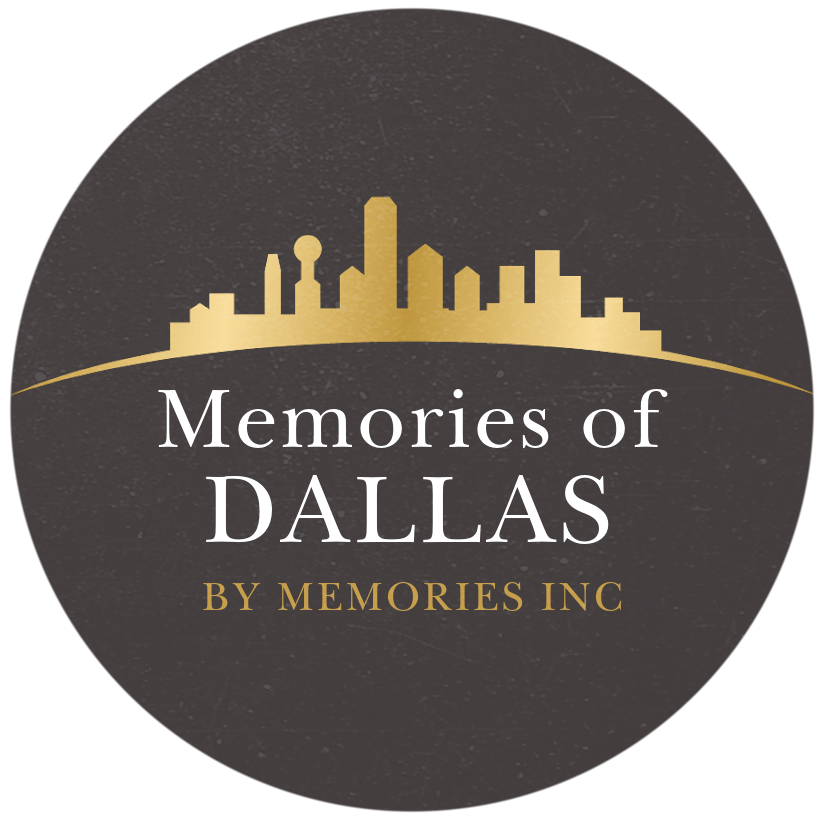
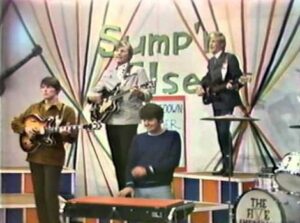
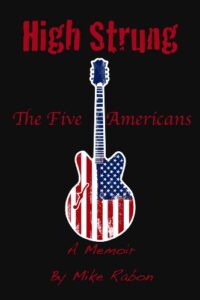
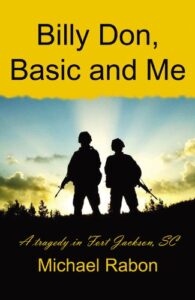


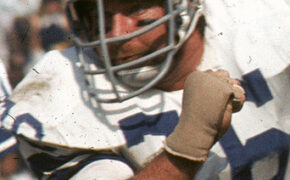
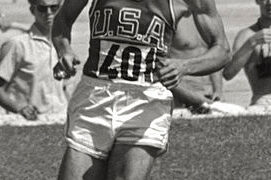
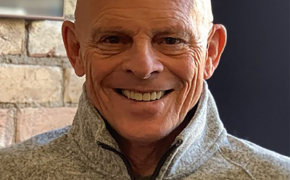
Scott somers
Great story. Thanks from a fan. I have read the book. Really liked it.
pheckmann
thanks. It was a great journey for Mike – and for all of us that remembered Western Union playing on the radio in the 60s
pheckmann
thanks Scott. Mike was a great interview
Jerry Nelson
The 5 Americans were another group i loved and grew up with……i was at Studio Club alot in late 60’s i was on Sumpin Else a couple of times……so i really appreciate you and your interview.
Loved….Western Union
pheckmann
thank you sir! It was a neat snapshot for me. I would listen to KRZI in Waco about the time ‘Western Union’ came out, just about to hit my teen years so to be able to get a snapshot was incredible. A perfect example of why we started ‘Memories of Dallas’. More to come!
Bud Buschardt
Paul,
I enjoyed your interview with Mike Rabon. Just wanted to add a P.S. to your story. The Five Americans had a reunion for a TV special on (then) Fox 33, KDAF. “Hometown Hits” featured interviews with music stars that were from or lived in the DFW area. Highlight of the show was a reunion concert from the Five Americans at the old Hard Rock. Michael Bell and I produced the show that aired on December 9, 1988.
meminc
Unfortunately we lost Bud a few days ago. This reply slipped through the cracks. Thought you folks that knew him might enjoy his final comment
Leland W Fortner Jr
I met Norman in Lodi, Ca. My co-worker went to the same church as him. I asked him to call me and he did. I only collect records, am not a musician. We met at a park in Lodi where he was helping feed the homeless and singing Christian music. He was a very humble man and told me about fighting cancer and his life in the rock scene. He died when the cancer returned and I never got to see him again. I have a book and cd that was passed to all that attended the funeral. I now would like to find a greatest hit on vinyl to complete all the recorded hits of this talented group.